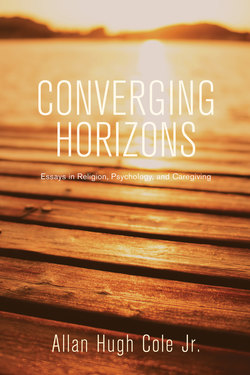Читать книгу Converging Horizons - Allan Hugh Cole - Страница 9
На сайте Литреса книга снята с продажи.
Acknowledgments
ОглавлениеI appreciate the opportunity to publish a third book with Cascade Books, and to work again with the outstanding and gracious editorial, production, and marketing staff at Wipf and Stock. I am especially appreciative of Rodney Clapp, my editor; Jesselyn Ewing, my copy editor; K. C. Hanson, editor in chief; Matthew Wimer, assistant managing editor; Laura Poncy, editorial administrator; Ian Creeger, typesetting; the design team; and James Stock, director of marketing.
Alison Riemersma, executive assistant to the academic dean at Austin Seminary, where I served for eleven years, provided invaluable editorial and administrative support for this project. I remain grateful to her for her consistent proficiency and for her efforts in support of my work through the years.
My wife, Tracey Cole, and our daughters, Meredith and Holly, fill me with joy, laughter, and gratitude each day. Their love and presence in my life brings forth unmatched delight, and hope. My parents, Allan and Jeri Cole, have graced me with love, support, and encouragement, and I am thankful.
I am also thankful for Jaco Hamman, my longtime colleague and friend, who wrote the foreword to this book. We met as doctoral students and have grown up together as scholars and teachers. As one who works so ably at the intersections of psychology, religion, and counseling theories, he has taught me much by demonstrating why and how integrative approaches to caregiving prove invaluable.
For over three decades, Donald Capps, my doctoral advisor at Princeton Seminary, has been a leader in fields related to religion, psychology, and pastoral care and counseling. He has taught effectively and written prolifically, and through his pioneering work and his winsome nature he has mentored dozens of others, including scholars and practitioners in a range of academic disciplines and professional fields. He models how one may work at a point of converging horizons—that is, with hybridity across disciplines and practices of caregiving, in his case both as a pastoral theologian and psychologist of religion. In doing so, he demonstrates how moving back and forth within these complementary areas of study in one’s scholarship may strengthen both of these professional identities and their tasks. More important, Don demonstrates untold generosity toward his students, which illustrates even more vividly than his fine scholarship what profound kindness, attention, and concern may offer to those who learn and hope to teach others. This book is dedicated to him with my admiration and deep gratitude.
